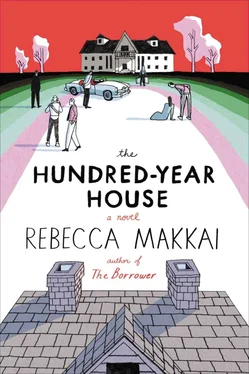Zilla said, “We are like flowers, Mr. Devohr. We might exhibit ourselves in the city, but we grow best in the wilderness.” She touched his arm with two fingertips. She wore all white.
“Huh.”
Fannie said, “We don’t even have a proper studio right now, Josephine and I. We’re trying to make enough pieces here this month to last the rest of the year.”
“What, to sell?”
“That is how artists make a living.” Samantha must have realized how sharp she sounded because she took a long drink of water and looked around the table. She wanted someone to rescue her.
Marlon said, “I’ve written a tremendous amount, this stay. A tremendous amount.”
Gamby listened patiently, and soon enough he was focused in again on Marceline, asking about the talkies. “Von must speak from farther up in the throat,” she was saying. “Or it von’t record vell. You do as if you vere talking into the telephone.”
He said, “I heard they can do gunshots now. Isn’t it true, they invented a slow-motion pistol just so it’ll record?”
“Yes,” Marceline said. “It opens many possibilities.” Brave woman, chatting so amiably about the death knells of her own career.
Zilla, seated to Gamby’s left, was the one responsible for figuring out how serious he was in his mission, how doomed they all really were. If anyone could get a man to give too much away, it was Zilla — her palpable empathy, the way she leaned into everything you said. Even Eddie relaxed when he talked to her, and the chill vanished. Being near Zilla was being near a small, smooth lake.
Eddie forced a bit of bread. He’d lost weight here. If he stayed any longer, he might vanish entirely. He heard Zilla, her voice a bit higher, more emphatic than normal: “Oh, but we don’t even interact with the town! It’s like an invisible fairy castle! This is my third stay, and I haven’t set foot off the grounds but once, when I cracked my wrist and was rushed to the doctor. I don’t suppose they think anything of us at all!”
A minute later, Gamby laughed for all the table to hear: “It goes without saying that if I’d decided to be an artist or a poet , or what have you — my father would have sent me over Niagara in a barrel.”
“Yes.” Zilla said it through her teeth. “We’re awfully lucky to do what we do.”
Viktor was rotating all the food on his plate to the left. Choreographing his vegetables. What must it have meant, Eddie wondered, to be accustomed to young dancers he could throw around — literally throw in the air! — and then to fall in love with a woman like Zilla? A woman so grounded, so unflappable (so married too), that he, Viktor, would inevitably be the one to bend and break. It would be unbearable, surely.
Gamby was saying: “So when you start a painting, do you arrange all your fruit and whatnot on a table, or do you just make it up?”
Eddie watched Armand and Marlon pretend to talk to each other. Marlon had removed his smoking jacket for once, and he might even have been sober. His moustache was waxed. Armand, beside him, his hair combed into golden waves. Armand’s teeth looked as if each had been collected from a different man’s mouth, a sort of harlequin set. Eddie remembered a toy Roman arch where, when the keystone was pulled, the entire thing collapsed. He imagined that if he pulled out Armand’s incisor, something similar would happen, the splendors of the ancient world giving way all at once.
Eddie excused himself from the table as the orange layer cake was served, and said he must lie down with his headache. It pained him to be so rude, but his one task tonight was to sneak Ludo his dinner. And then he’d pack his trunk. He wanted to leave as soon as possible in the morning.
In the kitchen, Eddie picked up the covered plate from the cook and wove past the sinks to the back exit. A small blonde girl, no more than four, sat at the counter on a stool, staring disconsolately at a plate of peas. Her milk glass was empty.
“Mr. Devohr’s daughter, Grace,” the cook whispered. “I don’t know what I’m expected to do with her.”
When he returned from the attic with the empty tray, she was there still, and she glanced up with hopeful eyes, until she saw he wasn’t her father. He wondered if anyone had considered her in the midst of all the planning. He didn’t imagine they’d found a maid to watch her, to put her to bed. He said, “I have an important job to do. There are hungry fish out back, and I’m going to give them their supper. I don’t suppose you know how to rip bread very, very small.”
Grace gave him a deep, appraising look, like an old lady’s. “Oh yes I do!”
“Well, you’ll have to help me, then. I’m afraid I’m not very good at it. The fish are always complaining. Will you come along?” She hopped from her stool, and the cook, winking, handed Eddie two slices of the dinner bread. He put one in Grace’s hand and said, “This one’s too heavy for me.”
“Are your arms very skinny?”
“Yes, quite.”
They sat on the two big rocks by the largest koi pond, and Eddie showed her how to tear tiny pieces and throw them in. They watched the fish come to gobble the crumbs, their round mouths impossibly large.
“The spotted one is my best one,” Grace said. “What is his name?”
“Oh, that’s Elwood. A terribly distinguished gentlefish.”
“Does he love bread the best of any food?”
“ Almost . Almost. Do you know what he told me the other day? He wishes, more than anything in the world, for a root beer float.”
Grace looked skeptical. “It would fall apart in the water.”
“That’s precisely the problem. He’ll never get his wish.”
“But I know how to do it! Take him out with a big scoop, and put him into the root beer float. He can eat it from inside it.”
“Ha! You are an exceptionally wise young lady. I might make a poem about you.”
She threw another crumb and thought a moment. “Face.”
“I beg your pardon?”
“That’s what rhymes with Grace.”
—
He convinced her, miracle of miracles, to lie in bed with a book. He read her the story of Rapunzel from the Brothers Grimm she’d brought on the train, and he changed her into her white nightgown, and he tucked her into the spare bed in Samantha’s house, in the room behind the office that Gamby had surprised everyone by accepting. He drew the blinds against the evening sun — it was only ten to six — and told her that back in Toronto, it was nearly midnight.
“Can you remember what I just read you? You can look at the pictures all over again.”
“I can read words. I can even read the big words!”
“I shouldn’t have doubted it. Did you know, if you lie very still and read the same story ten times, you’ll have magic dreams?”
“Oh, I knew that.”
“So someone told you the secret. And Elwood will dream about root beer, and I will dream about you.”
Grace giggled and kicked her toes under the sheet. Eddie moved her water closer and kissed the top of her head. She smelled like sun and grass.
MARCELINE AT THE END OF THE WORLD
Zilla dropped her spoon on the table with a clatter, and said, a bit too loudly, “Oh, how clumsy of me!” Confirmation. That Devohr was here on a euthanasia mission. That he couldn’t be charmed. Marceline hadn’t caught his exact words, but then she didn’t need to — the man’s intentions were clear. And so: They all braced themselves, ran through their parts, such as they were, and tried to continue their several conversations as if nothing had happened.
Zilla took a breath to say something, but just then there came a loud knocking above them. A series of small, hard raps that seemed to travel the whole length of the house, ending over the window.
Читать дальше












